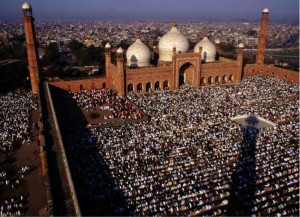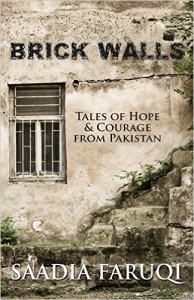My grandmother set down a plate of six or seven parathas with determination in her eyes, as though warning us we had no choice but to finish all of them. From the kitchen, pots and pans clacked as our cook constructed omelet after omelet at a pace that could, conceivably, break the sound barrier. My cousins yawned loudly between scavenging mouthfuls. From the couch, my grandfather disapprovingly surveyed the scene. “Ruby,” he said, peeking out from behind yesterday’s copy of The Express-Tribune, “You really shouldn’t have such large sehris. It’s not sunnat.”

We all stared innocently at the table spread where parathas, jam, scrambled eggs, omelets, kebabs, fruit cake, and the greater part of last night’s dinner lay. “Nonsense,” my grandmother snapped back in fast and hard Punjabi, the kind reserved especially for telling-offs. “Do you want them to starve?” She pushed a glass of mango juice into my hands “Are you trying to kill them? Are you trying to kill the children?” The room full of people laughed as my grandfather shook his head and ducked back behind his newspaper.
In Dallas, I wake up not by my grandmother’s shouting greetings or my cousins’ merciless shakes, but by my alarm. The morning is cold, which is odd, for July, but early mornings always seem to have this chill stillness about them. I stumble sleepily downstairs. Grabbing my phone, I text my friends who are up for sehri for some companionship. In the kitchen, I tread lightly, pouring myself a bowl of excessively sugary cereal – my favorite. The cabinet door slams shut, and I wince – I don’t want to wake the rest of my sleeping family up. They’re not fasting for reasons ranging from sickness to sloth. After my cereal, I gulp down cups of water until I think I’ll explode. Sitting at the table, I look out the window at my neighborhood. A few lonely cars rush by, carrying no doubt overtaxed commuters. Mostly, though, Dallas is at peace.
Despite my constant protestations in favor of secularism, my dirty little secret was that I quite enjoyed the azaan ringing out over Lahore’s busy streets five times a day. It bound the blinding city together. The first azaan for Fajr woke the pearl of the Punjab up, little by little, each day. Today, it found my five cousins and me restlessly crowding around two jahnamaazs. As the namaaz started, we fell into hushed silence. From the corner of my eye, I caught one of the young ones clinging to my grandmother’s feet as she did a remarkable job of steadfastly ignoring him and praying.
I spread out a similarly beautifully patterned jahanamaaz. I bought it in a bustling bazaar in Pakistan, wanting a touch of home for my prayers. Praying alone is different from being surrounded by people, but I think I may enjoy it more. It gives me more time to muse on my own spirituality and just talk, me and Allah. There’s something magical about namaaz that makes me feel like an enchanted child again. I finish just as the hectic day begins; I have, sadly, a Saturday full of errands to run. I stop first at the bank, then the post office and mall. There is, understandably, no sense of Islamic community among the folks in my conservative Dallas suburb. It’s not necessarily a bad thing. I keep the knowledge and feel of Ramadan in myself, tucked into my belly like a light. The rest of the world around me may not be fasting, but Allah is as omnipresent as ever. It’s four o’ clock before the hunger starts setting in. My brother goes to prayer at our small local mosque, but it’s not a place where I feel particularly welcome, so I return home to pray Asr.
By the time Asr hits, I’m slumped on a couch in my grandmother’s living room, thinking that if this goes on any longer, this not-eating business, I might cry. My cousins are in equal states of disrepair. Soon, we’re dragged out to the market together, in an attempt on the adults’ part to 1) shake us out of our whininess and 2) make the time pass quicker. If silence is loud, a Pakistani market on a day during Ramadan is absolutely deafening. The fast is everywhere, on everyone’s minds, even in wordless interactions like buying meat or brushing by strangers. Ramadan is like an all-encompassing haze, settling comfortable and agreeably over the city.
When the fast gets hard, usually in the hour or so before it breaks, I think back to the Pakistani market and the workers I always saw there: young men spending their whole day preparing jalebis and samosas over hot stoves and worn shopkeepers constantly on their feet. All of these people were also fasting, but they didn’t have the luxury of accommodating their fast with large (and possibly excessive) amounts of downtime and like my family and I do. At iftar, I miss the samosa and jalebi tradition briefly but remind myself how blessed I am, to be surrounded by family, food, and faith. My parents and brother eat with me and I eagerly bite into dinner as soon as the clock hits the right number.
One of my more food-happy cousins once confessed to me that iftar was no less than 75% of the reason he kept fasts. It was a reasonable feeling; the iftaris put together by my grandmother were nothing less than a gift from heaven. Excited tension seized the house as the countdown to iftar begun, and when the azaan rung we gulped down our dates while exchanging ear to ear smiles. Then, we set upon eating the table worth of treats in front of us.
Ramadan as a kid and teenager in Pakistan, enveloped by scores of family members and the special atmosphere that hung over the country, was undoubtedly different from my experience of Ramadan in America. Different, but not necessarily better. While I appreciated the comforting sense of community ever present in Lahore, I know now that it’s not always needed to feel close to Islam. I can be alone, I can be isolated, and still Islam will light up my heart just as it did in Pakistan. As I’ve learned, God may not be always be seen, but that does not mean that He is not still everywhere.
For more on MMW’s Ramadan series, and to read the rest of this year’s Ramadan posts, click here.











